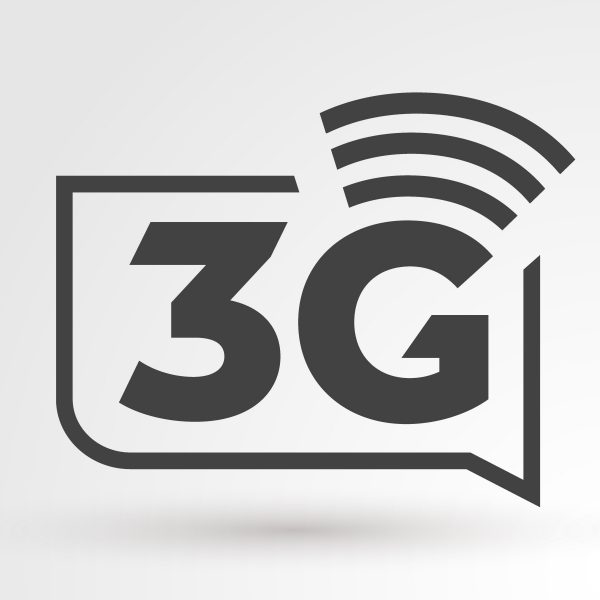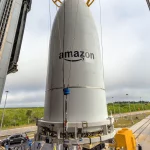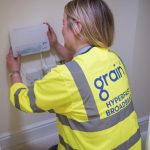EE Switches Off Final 3G Mobile Network Site in the UK

Mobile network operator EE (BT) has today published a short progress update on their national work to switch-off the old 3G data (mobile broadband) network, which reveals that the last of 18,000 sites to be shut-down – in Belfast – was finally taken off the air last week.
The United Kingdom’s mobile operators (EE, O2, Vodafone and Three UK) are currently in the process of phasing out their old 3G services, with 2G services expected to follow by 2033 at the latest (here). Most operators expect to have completely phased out 3G by the end of 2024, although O2 (VMO2) won’t begin this stage until 2025.
For its part, EE began moving customers off their old 3G network last year, but the final switch off phase didn’t begin until January 2024 and was due to run until March 2024 (details). Previous trials had shown no complaints about any negative impacts upon network coverage or performance from the switch-off, although the latest update doesn’t clarify whether that has held true during the final full switch-off phase.
Advertisement
However, the radio spectrum that EE frees up as a result of this change will go toward improving the performance and coverage of their more modern 4G and 5G networks, while there has also been a dramatic saving in energy usage. Only a few months ago, the old 3G network still accounted for 0.4% of EE’s downloaded data, yet gobbled around 35% of the operators’ total electricity.
Greg McCall, BT’s Chief Networks Officer, said:
“Having spent 2023 phasing out customer reliance on 3G and completing a detailed pilot switch off in Warrington, we were able to confidently start the nationwide 3G switch off as planned in early January.
Since then, we have been responsibly and methodically retiring the technology across more than 18,000 mobile sites, with dedicated pauses built into the process so we could closely monitor each region in real-time.
We have now successfully completed the nationwide closure of our 3G network, resulting in big improvements for both our customers and the environment.
Those 3G customers who have transitioned to our 4G and 5G networks are now enjoying more reliable and widespread mobile coverage with faster mobile internet speeds, while switching off 3G has already saved enough energy to charge nearly one billion smartphones.
We will continue to monitor the performance of our other mobile technologies (2G, 4G and 5G) to ensure EE customers continue to get the high-quality connectivity experience they need from the UK’s most reliable mobile network.”
Meanwhile, Vodafone is in a similar state to EE, albeit with the operator expected to have completely switched off their old 3G network by the end of last month (they’ve yet to issue an update). On the other hand, Three UK aim to switch off the service by the end of 2024 and O2 (VMO2) will begin the switch-off process in 2025 and complete it by that same year, mainly due to having a larger legacy of 3G devices in their network (e.g. Smart Meters).
Mark is a professional technology writer, IT consultant and computer engineer from Dorset (England), he also founded ISPreview in 1999 and enjoys analysing the latest telecoms and broadband developments. Find me on X (Twitter), Mastodon, Facebook, BlueSky, Threads.net and Linkedin.
« Netomnia Reveals Plan for 50Gbps UK FTTP Broadband Network






















































Hi Mark, has the spare spectrum actually been re-farmed?
I was wondering the same thing. It’ll be hard to measure for sure, but I’d love to see a before/after.
EE previously confirmed that spectrum used for 3G would be re-farmed for 4G and 5G, but they told us last year that this will be a process that happens over time (i.e. it won’t be immediate on the same site).
The operator will focus early reuse of it in areas of the greatest need (sites more congested, or areas at risk of congestion), which mirrors how they operated with 15MHz of the 2100MHz band that has already been refarmed from 3G. To date, this has happened across around 20% of their sites, and they’re more than doubling that (to just under 50% of all sites) by the end of 2024.
There’s no evidence of the refarming being live just yet, but there are some limitations with doing so when adjacent to sites with the same spectrum in use.
So just as the switchoff was staggered, so the refarming is likely to be.
I suppose an interesting side effect is what this means for the future of MBNL – already shaky with Three doing their own thing and using non-BT backhaul, but 3G was where they were very close IIRC, with MBNL managing a shared 3G RAN on behalf of what used to be T-Mobile and 3.
I thought ee didn’t want to part pay for upgrades for old MBNL t-mobile/3uk sites just to spite 3uk not getting 5g upgrades (as the ee share sites have good 4g speeds but no 5g, non of the MBNL around here have 5g on them)
3 has been installing O2 like poles (clean looking ones) in a lot of places (not shared with ee) ee have some new ones as well but not many where they are needed
Vodafone still installs roof top like masts on poles on private business witch look a mess
MBNL is slowly morphing into a passive asset operator, in a similar way to CTIL.
So each operator has their own active assets (radios, rigging & antennas) on a shared passive tower/structure.
This is bad news of you don’t live in a city bathed by loads of 4G and 5G.
My network has gone from not to bad, go terrible by this move. My phone now drops out in about half the areas in town, whereas it used to fallback to 3G.
The chance of every getting 5G here is slim to none, and I can’t see operators turning up 4G either.
Net gain for the operator, net loss for the consumer.
I don’t live in a city. I don’t live in a town. I have 4G and 5G. I have it virtually everywhere I go, and I did not notice the EE 3G shutdown until I read about it on this website’s forum.
Why don’t you think you’ll ever get 5G? Of course you will. 4G will come too, as it’s now effectively the “base” layer of coverage.
Do you have VoLTE / 4G calling enabled on your phone? If its a “modern” iPhone (ie 6 or newer) it will be automatic, but on Android it might be off or unavailable.
What area are you talking about? Because here in Gloucestershire there is wall to wall 4G and rapidly expanding 5G with EE.
I didn’t even notice 3G had been switched off because I am very rarely ever without 4G.
Even occasional cross county trips I always see 4G/5G.
If you’re talking about the Vodafone 3G switch off, then maybe you’re right.
Their switch off has been a mess and they don’t have the same level of 4G coverage to fall back on as EE do.
Vodafone VoLTE especially on android is random if it’s supported by your rom (most recent/last 5 year phones are usually fine)
IPhone support is only enabled on iPhone 8 and newer in Vodafone even though iPhone 6/se v1 works fine on other networks
Ee/3uk usually universally supported on all phones
Can’t say about O2 due to only having a giffgaff sim and it’s unreliable data in daytime (lowest QOS data priority on o2)
still no VoLTE support on giffgaff (but that’s the same on all virtual networks so they have to drop to 2g to make calls work if no 3g available)
I concur that the Vodafone 3G switch-off has forced me back onto hideous 2G for voice, which is awful from a call quality perspective. Plenty of voice drop-outs too. However, 4G here for data is fine for my needs (North-West Ipswich).
What the networks (i.e. Vodafone) don’t tell you in all their fancy advertising is that 4G calling / VoLTE is only available to you if you have one of the very few models of phone that Vodafone have specifically allowed. I’d love to know how the other networks are on this front. Are they so restrictive? Does anyone know? The emails / texts warning that you may need to buy a new phone to continue to make HD calls makes no mention of this. It appears many people have been caught out when their new purchase also fails to do 4G voice calls.
I see Lee has unwittingly managed to answer some of my questions before I had chance to even submit my own original comment. Spooky.
ah yeah I forgot some networks (or rather MVNOs) still don’t have VoLTE at all.
EE are generally very liberal when it comes to VoLTE compatibility on Android. I’ve used phones that EE have never sold and it worked as soon as I put the SIM in. Even my old old OnePlus 3 had 4G calling (but not wifi calling, weirdly).
Still a few users who think that coverage is dictated by the “G” or the radio access technology. It’s only a minor factor, but much more significant is the spectrum in use for each RAT – specifically high-band or low-band.
EE has a fundamentally different network design to VO2, this is partly why they’ve been able to switch off 3G quicker and with much less impact. Coverage issues that do result are often as much due to rollout & deployment choices, as they are network design.
funny enough Lyca mobile supports both VoLTE and WiFi calling now on EE and I see more 5G then 4G recently.
VoLTE & WiFi calling is available to me on my Vodafone SIM only contract with my mobile purchased elsewhere.
So it’s not only Vodafone supplied or contracted mobiles which can access these services
For me in rural Suffolk it’s been a big improvement, 3g has disappeared and it’s been replaced with 4g which just seems to work better.
EE used to be a no go for me, but over the last 6-9 months it’s improved hugely, in no small part because terrible 3g has given way to slow but passable 4g
Still got 3g on O2 on a 12 year old Blackberry Curve in NW London. Though the internet bit doesn’t work properly as Blackberry withdrew support years ago. Nevertheless its good for texting and calls and meets by needs – I use it as the “Bin” quoted for all institutional POCs.
Even if 3G goes next year, 2G is still around till 2033, and the BB phone (Recently home refurbished) will suffice as either the Mobile “Home” phone or the glove box spare . . . barring fatigue/lifespan failure (The previous Siemens C35i tuned its toes-up @ 11 years)
SYA – Sweat Your Assets
You can’t get good 5G or 4G on O2 but at least you can get 3G on a 12 year old blackberry!
Cool! So maybe Lyca will get off their **** and enable/allow VoLTE and VoWiFi. Because currently they have neither. S23 ultra/iPhone 15 pro.
it works on iPhone 🙂
not that I am adverting this awful network bu ti use it as backup to Vodafone , and their 3G off is way worse than I thought. now see EDGE more often than anything else.
Yeah my Lyca is working for VoLTE and Band 20 on my iPhone
I wish Vodafone would catch up. Falling back to 3G regularly in SE London is a bit ridiculous in 2024.
Such a shame we couldn’t turn off 2G instead of 3G as EE don’t offer data access on 2G. But that’s the price we pay for pushing out smart meters and other devices which seem to be 2G only.
I haven’t noticed any 4G coverage improvement on EE in my area and they still don’t offer 5G here, which is a battery drain anyway.
There’s nobody using it and with recent software updates they have removed the 3G only option.
2G is far more reliable and stronger than 3G for phone calls which is more of a priority than data especially for emergency calls in rural areas and buildings which 3G doesn’t travel through very well.
Rik… IoT [Internet of Things] devices run on 2G, so it’s important to keep it for longer. Yes they should have been moved off but it’s a process.
Things like smart meters, trackers & other things.
Newer IoT devices the last few years support 4G-LTE in addition to 2G-EDGE.
There wasn’t any value in keeping 3G-HSPA.
Yes, it seems very backwards like by giving 3G the boot and relying on old, archaic 2G technology to step in. It should have been the other way around: ditch 2G and keep 3G around, preferably on dual carrier mode too.
EE will now be hopeless where I live. The only thing keeping the network alive (since they twiddled with the mast in Sep 2021) was 3G – with that gone, the network is 4th (out of 4) for both coverage and network speed, even beaten by Vodafone and O2.
3G is a spectrum hog that does nothing that 2/4/5G can’t do better. That’s why all four networks are getting rid of it. EE and 3 have the additional issue in that it comes from separate (shared) equipment to the other standards.
It’s simply inefficient and it has to go.
Going to ask again – do the people who think they can’t get 4G have a phone with VoLTE enabled?
One of the main reasons 3G went before 2G is the technology has been outdated by 4 and 5G, 3G uses a flexi footprint for coverage, the more people on the cell using data, the smaller the footpring of its coverage (to a point).
This design was fine in the early days of fast data but more demand made it obsolete becase better technologies over took it.
2G will be around longer due to the frequencies used, giving greater distance over the more remote parts of the country, it is great for emergency calls which is one of the reasons it won’t be replaced until there is a fibre network covering the more remote areas of the country for newer technologies.
Alternative technology will also no doubt be available, such as satellite where it isn’t viable to run fibre in.
“2G will be around longer due to the frequencies used, giving greater distance over the more remote parts of the country, it is great for emergency calls”
Not quite… EE use 2G on 1800Mhz, as a fallback for non-VoLTE devices that are otherwise using 4G on 1800Mhz, 2100Mhz or 2600Mhz. Greater coverage is obtained for VoLTE-compatible device/SIM combinations on the low-band 800Mhz band.
So is this where EE saves 33% and reduces its customers bills by a similar amount? My contract with a phone ended and my renewal was £10 more. Absolute day light robbery
What a load of rubbish, you’ve now got 5G and additional capacity.
Some people are just clueless
Hi @Mark
Any idea when Vodafone will complete?
Yesterday.
https://www.vodafone.co.uk/newscentre/press-release/3g-successful-switch-off-uk/
It’s a bit too early for them to turn it off (very weird).
I still think 2G should be kept alive.
There are many devices out there that will be rendered useless when 2G is switched off.
Yes, they are only basic devices but that’s just it, they are basic devices.
Some people, especially the elderly only need a basic device and switching 2G off will cause a huge surge in e-waste, even if it isn’t until 2033.
And like has also been said, devices like smart meters use it too. Why throw them away when they still work?
My wife is on Lyca in London and can get 4g calling despite phone supporting.
My worry about EE is the extra 1.6m customers now using the network. Surely this will have a negative impact on EE capacity and speed?